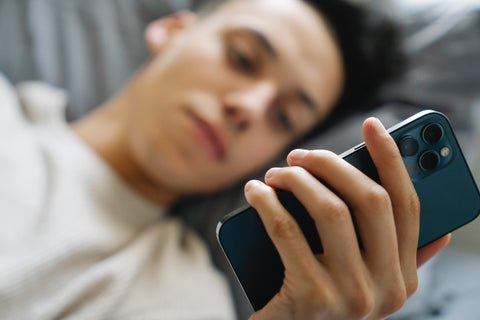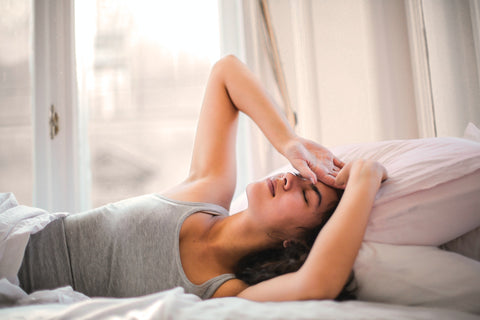Our active KT Tape fans know that proper sleep is a vital part of their healthy training and lifestyle, but is there a difference between men and women when it comes to their sleeping needs?
In this Wall Street Journal article by Andrea Petersen the sleep battle of the sexes is explored, discussing new research on the differences between mens and womens sleep habits: He sleeps. She sleeps. They sleep differently. Women tend to have more deep sleep and awaken fewer times during the night than men do. They also weather some of the effects of a lack of sleep better than men, according to recent studies. Still, men overall say they are more satisfied with the amount and quality of their shut-eye than are women.
Getting enough sleep is an important factor in maintaining overall health. Scientists are increasingly focusing on gender differences in sleep, seeking clues about why women are more likely to suffer insomnia, for instance. Some researchers suggest that differences in sleep patterns could help explain why women live longer than men.
"Women on average have longer sleep than men; women on average are healthier than men. It could be that those are related," says Daniel J. Buysse, a professor of psychiatry and clinical and translational science at the University of Pittsburgh.
Sleep difficulties have been linked in many studies with chronic conditions like cardiovascular disease and diabetes. Most people regularly sleep with a partner, and some research has shown that people wake up more and have less deep sleep when they sleep with another person. Still, people generally say they are more satisfied with their sleep when they are with a loved one.
"There are objective costs to the physical presence of someone else in the bed," says Wendy M. Troxel, an assistant professor at the University of Pittsburgh and a leading researcher on relationships and sleep. But "the safety and security we derive from our social relationships trumps the cost," she says.
Men and women have different body clocks. Men's average "circadian period" was 24 hours, 11 minutes six minutes longer than for women, according to a study presented at the American Academy of Sleep Medicine's annual meeting in June in Minneapolis. Although six minutes doesn't seem like a big deal, the effects can compound day after day.
Researchers determined circadian period by measuring core body temperature and levels of the hormone melatonin. During the study, which involved 157 healthy people, more men had circadian periods longer than 24 hours and therefore were predisposed to want to go to bed later and get up later each dayclassic behavior of so-called night owls.
By contrast, twice as many women as men had body clocks shorter than 24 hours and therefore wanted to go to bed earlier and get up earlier. "That may make it more difficult to stay asleep at the end of the night," contributing to insomnia in women, says Jeanne F. Duffy, associate professor of medicine at Harvard Medical School in Boston and the lead author of the study. For both sexes, a circadian period that is out of sync with the 24-hour clock can result in sleep deprivation as the week goes on.

People with short biological clocks may want to increase exposure to light at night and eliminate it in the morning. Night owls should reduce light exposure before bedtime and get bright light in the morning. Trying to catch up on sleep on the weekends can just push one's biological clock further out of whack.
Women, on the whole, get more sleep and fall asleep faster than men. About 30% of women said they sleep eight hours or more on weekdays, compared with 22% of men, according to the National Sleep Foundation's 2005 Sleep in America Poll, which surveyed 1,506 people. A small study looking at the sleep of healthy young adults found that women slept an average of 7 hours, 43 minutes in a night, or 19 minutes more than men. And women took 9.3 minutes on average to fall asleep, whereas men took 23.2 minutes.
The study, published in the journal Chronobiology International in 2005, followed 16 men and 15 womena small but not uncommon number for sleep studiesover three nights in a sleep laboratory. Given this, researchers say it isn't clear why in numerous studies women tend to complain more about their sleep, saying they don't get enough shut-eye and find it difficult to fall asleep and stay asleep. Sleep studies might not be picking up the whole story, some researchers say, adding that more investigation is needed.
While mothers of young children often feel like they get no sleep, Dr. Buysee says the research doesn't bear that out.
"This isn't going to be popular, but some studies show that mothers get more sleep than fathers," he says. Women likely feel worse because their sleep is so interrupted. "If the woman's sleep is more fragmented, she's going to suffer more consequences," he says.
Multiple studies have shown that women generally have more slow-wave sleep, which is the deepest sleep. It tends to happen in the first part of the night and is critical to memory formation. Women may be better able to cope with sleep deprivation than are men, probably because they get more deep sleep, recent research suggests.

A small study, presented at the American Academy of Sleep Medicine's annual meeting, aimed to mimic the common practice of people not getting enough sleep during the work week and then trying to make up for it on the weekends. Both men's and women's performance on a 10-minute computer task that measured reaction time and speed, among other variables, deteriorated after five nights of only six hours of sleep.
Men and women have different body clocks, according to a study presented at the American Academy of Sleep Medicine's annual meeting. But women's scores slipped less then men's, and recovered to a greater degree after two nights of extended sleep, of eight hours.
"I think what our data show is that women can deal with sleep loss better than men," says Alexandros Vgontzas, professor of psychiatry at Penn State College of Medicine in Hershey, Pa., and a co-author of the study, which involved 16 men and 18 women.
Sleep can help reinforce learning in both men and women, such as college students readying for an exam. But to absorb certain kinds of knowledge, known as perceptual learning, men needed a nap whereas women didn't, according to another study presented at the sleep medicine academy's meeting.
In the study, 126 subjects completed a task that required them to identify differences in the movement of dots on a screen. The subjects then underwent some training in the task and were tested again to see how much they had learned. Men only learned after a nap. Women learned whether they napped or not.
"It may be the case that women are better suited for tasks requiring sustained perception, jobs like air-traffic controllers or radiologists who are reading MRIs," says Elizabeth McDevitt, a study coordinator at the University of California, San Diego and the lead author of the study
To read the entire article and view interactive images, visit wallstreetjournal.com.









